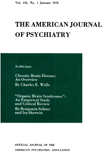Tyramine infusions in bipolar illness: behavioral effects and longitudinal changes in pressor sensitivity
Abstract
Steady state intravenous tyramine dose pressor-response tests were administered to a patient with bipolar illness during depressed and hypomanic phases of her illness. The greatest tyramine sensitivity while unmedicated occurred when the patient was hypomanic, and the least sensitivity when she was depressed before her first switch. The data raise the possibility that changes in peripheral alpha-adrenergic receptor sensitivity accompany spontaneous mood cycles. Tyramine produced a replicable mood and cognitive alteration only in the infusion closest to the switch from hypomania to depression, suggesting that the CNS may be particularly susceptible to peripheral noradrenergic inputs at specific points in bipolar illness.
Access content
To read the fulltext, please use one of the options below to sign in or purchase access.- Personal login
- Institutional Login
- Sign in via OpenAthens
- Register for access
-
Please login/register if you wish to pair your device and check access availability.
Not a subscriber?
PsychiatryOnline subscription options offer access to the DSM-5 library, books, journals, CME, and patient resources. This all-in-one virtual library provides psychiatrists and mental health professionals with key resources for diagnosis, treatment, research, and professional development.
Need more help? PsychiatryOnline Customer Service may be reached by emailing [email protected] or by calling 800-368-5777 (in the U.S.) or 703-907-7322 (outside the U.S.).



